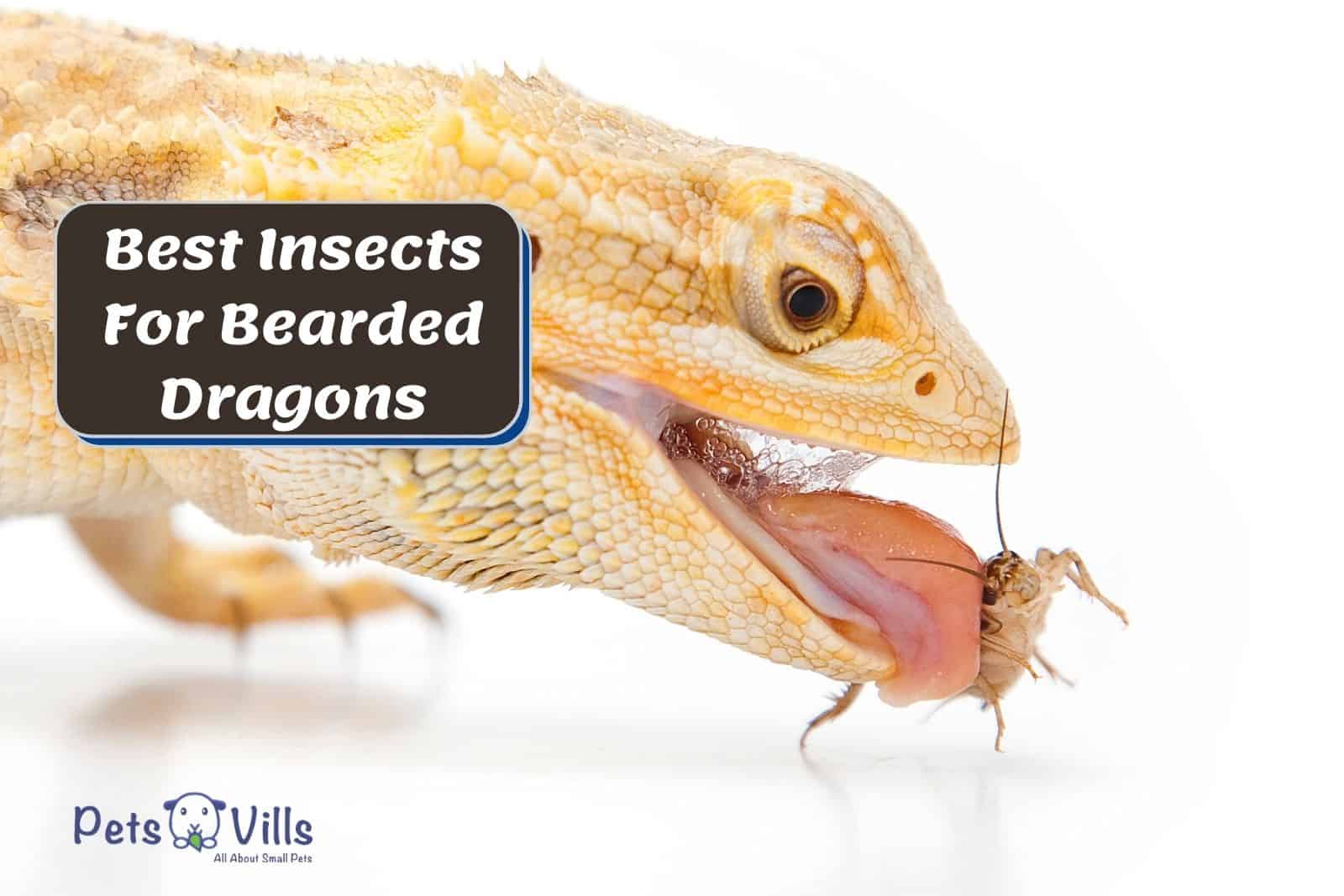I was out shopping for groceries recently and wondered what are the best insects for bearded dragons?
As a new beardie parent, I want the best for my pet lizard, Josie.
So I swung by the local pet store to ask what bugs do bearded dragons eat and what they can’t.
Here is what I found out from a reptile expert during the visit.
This post contains affiliate links. We earn a commission if you make a purchase after clicking on our links.
Don’t have time? Check this comparison table of our top faves!
Table of Contents
9 Best Feeder Insects For Bearded Dragons
As a bearded dragon parent, you are probably aware that beardies are hardy eaters. The pogona vitticeps species usually grow with a significant carnivorous instinct but change to omnivorous as they age.
Moreover, there is a broad range of insects you can feed your beardie to provide the essential nutrients needed. Here is a guide to the insects to feed your lizard.
Here’s an in-depth video analysis that you can check beforehand!
#1 Crickets
Crickets are among the affordable staple feeder insects you can give your beardie without any health concerns. These insects are highly nutritious and carry significant protein and calcium levels.
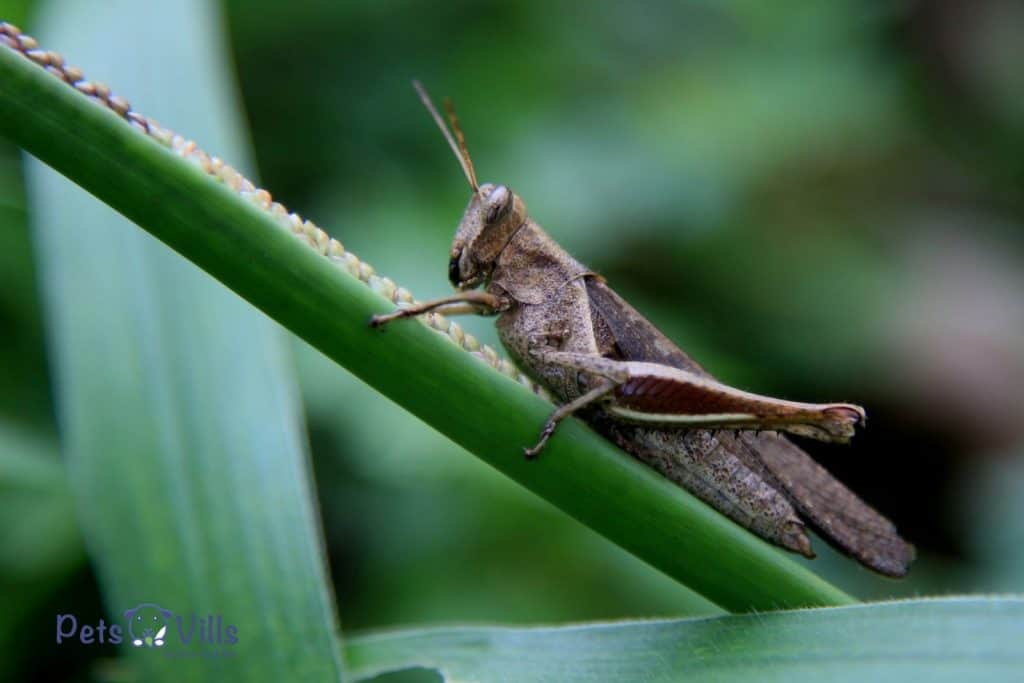
As a rule of thumb, ensure the crickets you intend to feed your beardie are not larger than the space between their eyes. This will help avoid impaction or difficulty in feeding. (1)
Also, note that crickets have hard hind legs that a beardie will have a difficult time digesting. Thus, it is advisable to provide plenty of hydration to allow for easy feeding.
The other notable features of crickets are that they are noisy, can bite your beardie, die quickly, and tend to be smelly. They can also escape easily, so get a cricket keeper or plastic tote to stash them.
If you regularly feed your dragon crickets, it is best to give them a fecal exam twice annually. This fecal exam is best done by a vet to examine for any underlying intestinal issues or parasites.
Check: How Many Crickets to Feed a Baby Bearded Dragon?
Here is the cricket’s nutritional profile.
| Calcium | 275 mg/kg |
| Protein | 15.4% |
| Phosphorous | 2520 mg/kg |
| Fat | 3.3% |
| Moisture | 77.1% |
| Fiber | 2.2% |
| Ash | 1% |
#2 Mealworms
Another popular and cost-effective feeder insect to feed your beardie is the mealworm. However, note the mealworm has a hard outer shell called chitin.
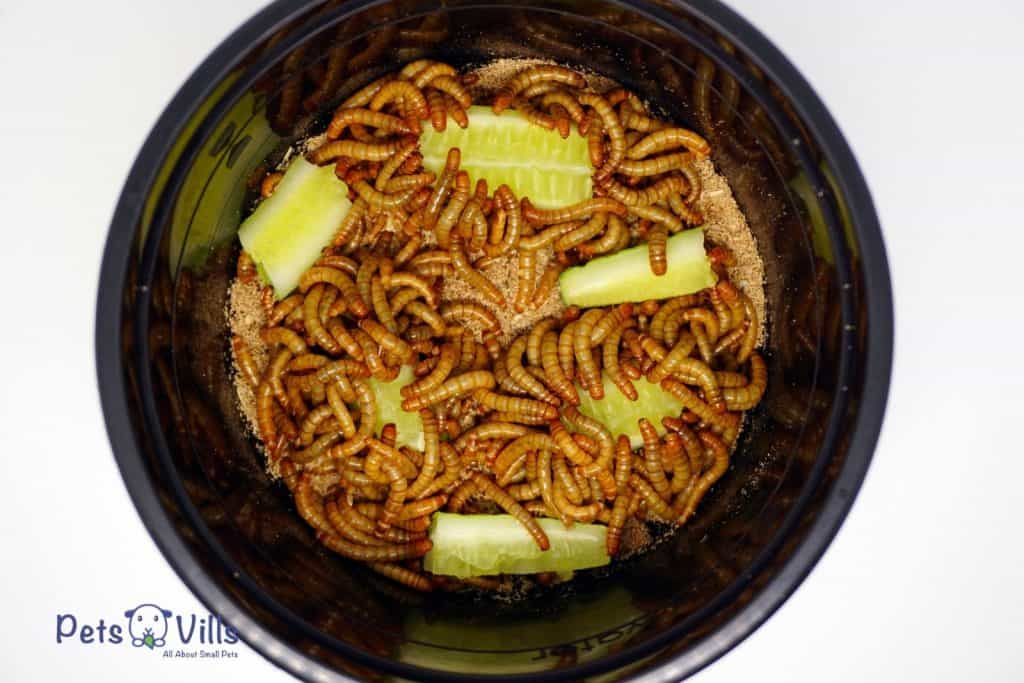
Baby bearded dragons will have a challenging time digesting chitin hence this insect is only suitable for adults. Moreover, even when feeding your adult dragon, do not exceed more than six mealworms per feeding.
Here is their nutritional profile.
| Calcium | 169 mg/kg |
| Protein | 18.7% |
| Phosphorous | 950 mg/kg |
| Fat | 13.4% |
| Moisture | 61.9% |
| Fiber | 2.5% |
| Ash | 0.9% |
Check out this video on how to best prepare them for your pet bearded dragon!
@kams.reptiles here’s what i do with my thousand mealworms and how i keep them alive long enough to feed them 🙂 #mealworms #feederinsects #beardeddragon #bugs ♬ Sneaky Snitch – Kevin MacLeod
#3 Superworms
These affordable superworms for bearded dragons are best fed alongside other bearded dragon foods. This is because they are high in fat content and thus should be treated as a treat which you can dust with calcium powder.
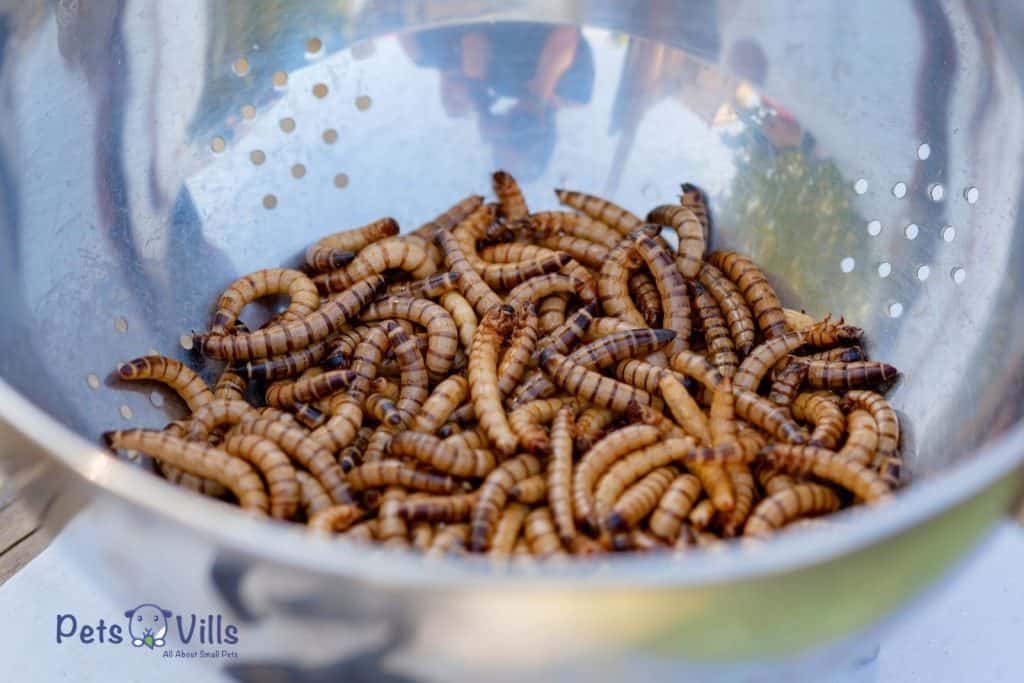
They are usually mistaken for mealworms due to their close resemblance but the two have notable differences. Their chitin is softer than the mealworm’s and can be fed to juvenile bearded dragons.
Here is the insect’s nutritional profile.
| Calcium | 177 mg/kg |
| Protein | 19.7% |
| Phosphorous | 2370 mg/kg |
| Fat | 17.7% |
| Moisture | 57.9% |
| Fiber | 2.7% |
| Ash | 1.0% |
#4 Hornworms
This is a live treat your beardie will love for the appealing green color.
They contain high levels of calcium that help prevent metabolic bone disease, which you can learn about through Snake Discovery’s YouTube video below. (2)
They grow fast and boast a high water content to keep your beardie hydrated. However, be cautious not to overfeed your pet because it can cause a diarrhea episode.
These treats are best served alongside solid foods. Here is the goliath worm, aka horned worm’s nutritional facts.
| Calcium | 464 mg/kg |
| Protein | 9% |
| Phosphorous | 1394 mg/kg |
| Fat | 3.07% |
| Moisture | 85% |
| Fiber | 0% |
| Ash | 0% |
Check out this video about what not to feed your bearded dragon.
CANCELEmbed Copied!
#5 Waxworms
These are other popular feeders you should offer your pet as an occasional treat. This is because wax worms are high in fat content and can cause obesity and other health concerns.
It is best to avoid them if your beardie has an existing weight problem. And if you have to feed your lizard, limit the serving to no more than three a day.
Here is the treat’s nutritional profile.
| Calcium | 243 mg/kg |
| Protein | 14.1% |
| Phosphorous | 1650 mg/kg |
| Fat | 24.9% |
| Moisture | 58.5% |
| Fiber | 3.4% |
| Ash | 0.6% |
#6 Black Soldier Fly Larvae
If looking for an excellent calcium-rich feeder insect, go for the phoenix worm as it is popularly known. These insects have a soft and easy-to-digest body and can even fill the need for a calcium supplement.
Your pet beardie will surely love eating these!
@ericsherman17 Creed’s late night snack of black soldier fly larva 😋 #reptilesoftiktok #beardeddragon #feeders ♬ Eat It – “Weird Al” Yankovic
They are one of the best insects for baby bearded dragons due to their small size. However, when fed to an adult beardie, you have to feed them in large quantities which makes this treat expensive.
They are easy to store and have no smell, so you can stash them in your refrigerator. Moreover, they wiggle and this will arouse your lizard’s hunt and attack nature.
The black soldier fly larvae’s nutritional facts are as follows,
| Calcium | 9340 mg/kg |
| Protein | 17.5% |
| Phosphorous | 3560 mg/kg |
| Fat | 14% |
| Moisture | 61.2% |
| Fiber | 3% |
| Ash | 3.5% |
#7 Silkworms
Another feeder insect guaranteed to arouse your pet’s hunting and attack instincts is the silkworm. They are easy to digest and contain high amounts of calcium, making them an excellent treat.
However, note that these feeders are hard to come by, making them expensive. They are also harder to keep since they only feed on chow and mulberry leaves.
Here is the silkworm’s nutritional table.
| Calcium | 177 mg/kg |
| Protein | 9.3% |
| Phosphorous | 2370 mg/kg |
| Fat | 1.1% |
| Moisture | 82.7% |
| Fiber | 1.1% |
| Ash | 1.1% |
#8 Dubia Roaches
This is an insect feeder option your beardie will truly love. Dubia roaches have a high meaty profile and boast a vast array of nutrients beneficial to your lizard.
Just check out how yummy these critters are!
@kams.reptiles did you know dubia roaches are arguably the best feeder insect for your beardie? 😙 #fyp #asmr #dubiaroaches #beardeddragon #dubiaroach ♬ original sound – kam’s reptiles 🦎🦖
These roaches are easy to keep and breed independently if you happen to be looking to breed your bugs. You only need to provide a hiding place like an egg crate.
You can feed your beardie these roaches at various stages, including when the roaches are young or mature. Their nutritional content is as follows,
| supplement | Small size roach | Large size roach |
| Calcium | 700 mg/kg | 800 mg/kg |
| Protein | 21.4% | 23.4% |
| Phosphorus | 2600 mg/kg | 2600 mg/kg |
| Fat | 3.1% | 7.2% |
| Moisture | 71.5% | 65.6% |
| Fiber | 2.6% | 2.9% |
| Ash | 1.3% | 1.3% |
Check out this comparison video between different insect feeders.
#9 Butterworms
Another worm worth feeding your beardies is the butterworm. It is an excellent source of protein and calcium. They have a similar look to the phoenix worms but are bigger in length.
Their nutrient profile is as follows,
| Calcium | 125 mg/kg |
| Protein | 15.5% |
| Phosphorous | 2250 mg/kg |
| Fat | 29.4% |
| Moisture | 60.2% |
| Fiber | 1.4% |
| Ash | 0.8% |
Learn more about the best bearded dragons food in our book.
Worst Insects To Feed Your Beardie?
While the list of insects to feed your beardie is vast, there are particular ones you should avoid putting in the lizard’s varied diet. Here are the insects you should never feed your bearded dragon.

- Fireflies
- Wild-caught bugs
- Any venomous insects, for example, scorpion.
- Home-caught insects
- Boxelder Bugs
- Fishbait insects from bait shops.
For more information regarding what to avoid feeding your beardie, you can check out Alex Goin’s YouTube video here.
Insects For Beardies: Feeding Guide!
The best insects for bearded dragons contain good levels of nutrients and are appealing to your pet. Baby dragons need high levels of protein, calcium, and vitamin D3 to boost their growth and bone development. For this reason, you will note that your juvenile beardie prefers a staple insect meal over veggies.
Younger beardies also get hungry fast, and you have to feed them at least three times a day. However, this changes as the beardies grow, whereby they can feed once a day.
When choosing the best insects to feed your beardie, consider the beardie’s age. You do not want to feed your beardie insects they cannot digest or swallow easily.
These pet reptiles usually feed for 15 minutes, and it is best to clear away any uneaten insect after the beardie gets full. Also, avoid feeding your beardie dead insects as they carry no nutritional value and can make your pet ill.
How Often Should You Feed Your Bearded Dragon Insects?
The number of insects you can feed your beardie per day varies with the type of insect, and your pet’s health condition. While there are those you can feed in larger quantities in one go, others are recommended in limited quantities.

There are also insects that you should treat as a rare occasion treat, for example, waxworms. Also, note feeding depends on age since adult beardies have different feeding preferences than baby bearded dragons.
Can You Alternate Feeder Insects?
Yes, there are many insects a beardie can eat. The best way to allow for different tastes is to let your beardie enjoy different types of insects.

The feeders also have different nutritional profiles and thus will benefit your lizard differently. You can also feed various insects at the same time to provide more excellent nutritional value, instead of alternating them.
Where to Buy Quality Insects
Since your beardie can eat insects, that does not warrant you feeding them any insect you find. This is because insects are carriers of parasites and pesticides, which are toxic to your lizard.

For this reason, you want to feed your pet safe insects to promote their health. The proper place to get feeder insects is the local pet store, breeders, and online vendors.
You can opt to shop online if you’re looking to save time and money. Online retailers do deliveries and have a wide variety of food items.
However, for new beardie parents, a pet store or a breeder is an excellent option. This is because you can interact with the experts and ask any questions you have.
Can bearded dragons eat hornworms?
FAQs
Are crickets or roaches better for bearded dragons?
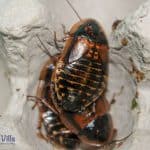
Dubia roaches are better to feed as they are easier for you to manage. But you can feed your beardie roaches or crickets and both are highly nutritious. Moreover, they are both affordable and readily available.
Do adult bearded dragons need to eat insects every day?
You do not need to feed your scaly friend insects each day. A serving of fruit and green vegetables alongside these insects is essential to keep your beardie healthy.
Are Dubia roaches better than crickets?

Yes, dubia roaches are better than crickets because they have no odor and are easy to breed and keep. Moreover, they contain more protein and are a better source of calcium than crickets.
Which insects should I feed my dragon daily?
There are various insects you can feed your dragon daily. These include Dubia roaches, crickets, super worms, hornworms, and black soldier fly larvae.
How do I keep my dragon bug-free?

You can keep bugs off your bearded dragon by adapting clean hygiene habits. Always wash your hands before handling your pet, clean the terrarium often, and clean after feeding.
Conclusion
Insects are an excellent way to give your lizard a balanced diet. These insects contain nutrients that help your insects survive and live happy life.
Now you have a list of nine of the best insects for bearded dragons. Moreover, you also know where to get the proper feeder insects for your lizard’s vital nutrients.
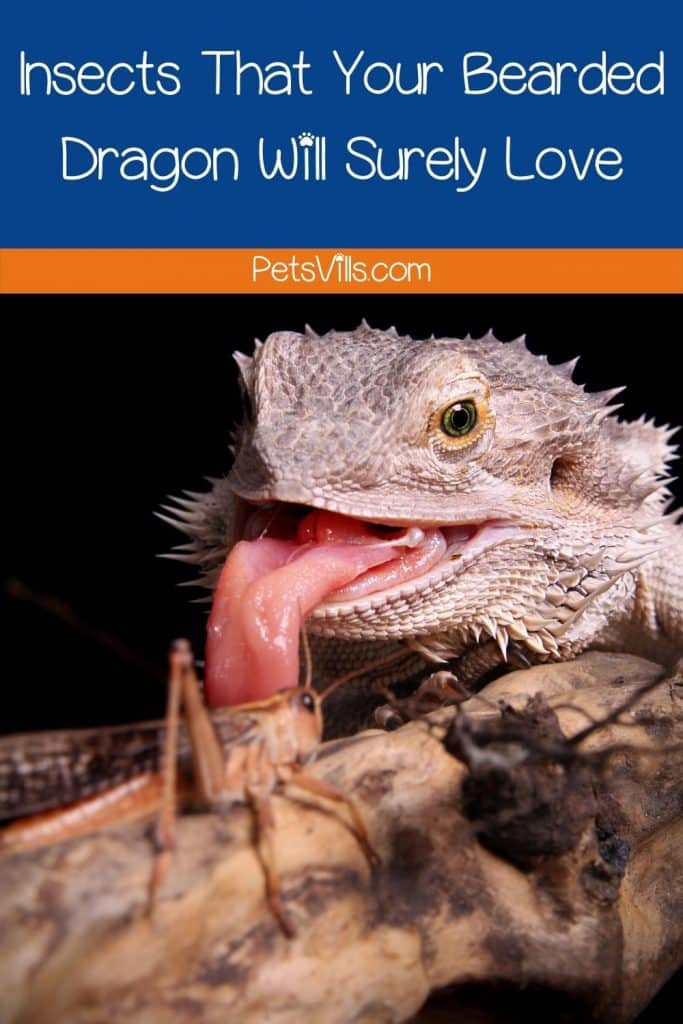
Which one of these insects do you feel best to feed your bearded dragon with? Let us know in the comments below!
References
- 1. “Bearded Dragon Care Guide | Long Island Avian and Exotic Vet Clinic.” Libirdexoticsvet, www.birdexoticsvet.com/bearded-dragon-vet.
- 2. “BBC Two – Trust Me, I’m a Vet, Series 1, Episode 1 – How to Prevent Metabolic Bone Disease in Bearded Dragons.” BBC, www.bbc.co.uk/programmes/articles/N9CkM0GVW83bWlFMQcjlnD/how-to-prevent-metabolic-bone-disease-in-bearded-dragons.
Hi there, I’m Johanna a writer, cat cuddler, and all-around animal lover! 🐈 I have two furkids of my own – a blue-eyed Siberian cat named Karakita, and a Siberian Husky Sundance who is the boss of us all. A lot of my motivation comes from my love of animals and want them to be treated with respect

